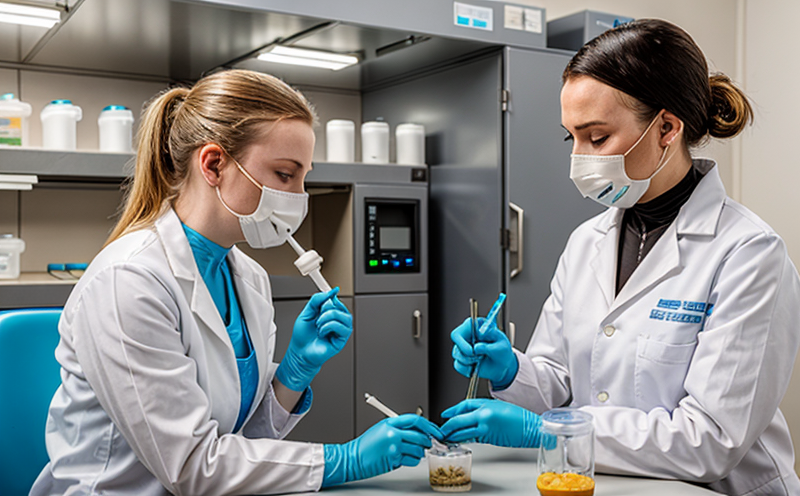ISO 69437 DON Detection in Pasta and Cereal-Based Meals
The presence of Deoxynivalenol (DON) in pasta and cereal-based meals can pose significant risks to human health. DON, commonly known as vomitoxin, is a mycotoxin produced by certain molds that may contaminate grains during harvesting, processing, or storage. Ensuring the safety of food products is paramount for quality managers, compliance officers, R&D engineers, and procurement professionals alike. This service, ISO 69437 DON Detection in Pasta and Cereal-Based Meals, provides a comprehensive approach to identifying and quantifying DON levels in these products.
The protocol outlined in ISO 69437 is specifically designed for the analysis of DON in cereal grains and their derived products. This includes pasta, bread, breakfast cereals, and other similar items that are commonly consumed globally. The detection method involves several critical steps: sample preparation, extraction, cleanup, and quantification using liquid chromatography with tandem mass spectrometry (LC-MS/MS). This advanced analytical technique ensures precise and reliable results.
The process begins with the collection of representative samples from various batches or lots to ensure that the testing reflects the overall quality of the product. Samples are then prepared by grinding them into a fine powder, which facilitates uniform extraction of DON. Extraction is typically performed using methanol-water mixtures under controlled conditions to dissolve the mycotoxin. The extracted solution is then purified to remove interfering compounds before analysis.
LC-MS/MS provides high sensitivity and selectivity for detecting trace amounts of DON in complex matrices like pasta and cereals. Calibration standards are prepared using known concentrations of DON, ensuring accurate quantification. The instrument generates a chromatogram where peaks corresponding to the target compound can be identified and measured. By comparing peak areas with those from calibration solutions, precise DON concentrations are determined.
Compliance with international standards such as ISO 69437 is crucial for maintaining product safety and quality. These guidelines provide specific methodologies that ensure consistency across laboratories worldwide. Adherence to these protocols helps in meeting regulatory requirements set by organizations like the European Union and the United States Food and Drug Administration (FDA).
For those involved in research & development, this service offers valuable insights into optimizing production processes to minimize DON contamination. Quality managers can use the results to implement corrective actions if levels exceed acceptable limits. Procurement teams benefit from ensuring suppliers adhere to these stringent testing protocols.
The ability to detect and quantify DON at low concentrations is essential for maintaining food safety standards. By leveraging ISO 69437, laboratories like Eurolab provide accurate and reliable data that contributes significantly to public health protection.
- Representative sample collection
- Methanol-water extraction method
- Purification of extracts
- LC-MS/MS analysis for quantification
- Calibration using known DON concentrations
Eurolab Advantages
At Eurolab, we pride ourselves on offering unparalleled expertise in food & feed testing services. Our state-of-the-art laboratory facilities equipped with cutting-edge technology ensure accurate and reliable results every time. We have a team of highly qualified professionals who stay updated with the latest developments in analytical techniques.
We understand that timely delivery is critical for our clients, which is why we offer expedited turnaround times without compromising on quality. Our robust quality control measures ensure consistency across all samples analyzed. Additionally, our commitment to confidentiality guarantees sensitive information remains safe and secure.
Our comprehensive services extend beyond just DON detection; we also provide a wide range of other food safety tests including pesticide residues, heavy metals, allergens, and more. Whether you're looking for routine testing or one-off analyses, Eurolab stands ready to assist you with your needs.
Quality and Reliability Assurance
The quality and reliability of our services are paramount at Eurolab. We have implemented strict quality control measures that adhere to international standards such as ISO/IEC 17025:2017, which ensures the competence and impartiality of our laboratory.
- Adherence to ISO/IEC 17025:2017
- Use of validated analytical methods
- Regular calibration of instruments
- Continuous staff training on latest techniques
- Internal audits to ensure compliance with standards
We conduct rigorous validation studies for all new methods introduced into our routine testing procedures. These validations include linearity, precision, accuracy, limits of detection and quantification, matrix effects, and recovery studies. Our laboratories are also accredited by various national accreditation bodies ensuring trustworthiness.
Our dedication to quality extends beyond internal practices; we participate in proficiency testing programs organized by recognized bodies globally. This helps us benchmark our performance against international standards continuously improving our capabilities.
International Acceptance and Recognition
The acceptance of ISO 69437 DON Detection is widespread across numerous countries due to its stringent quality assurance measures. Laboratories accredited under this standard are recognized internationally for their reliability and accuracy in detecting DON in food products.
Countries like the United States, Canada, Europe, Australia, New Zealand, and parts of Asia have implemented regulations based on or referencing ISO 69437. Compliance with these standards ensures that imported goods meet stringent safety criteria set by importing countries.
Our laboratory at Eurolab is accredited under ISO/IEC 17025:2017, which aligns perfectly with the requirements stipulated in ISO 69437. This accreditation guarantees our clients that they are receiving services from a reputable institution committed to excellence.
The international recognition of Eurolab's DON detection capabilities makes it easier for businesses operating globally to ensure compliance with diverse regulatory frameworks.





